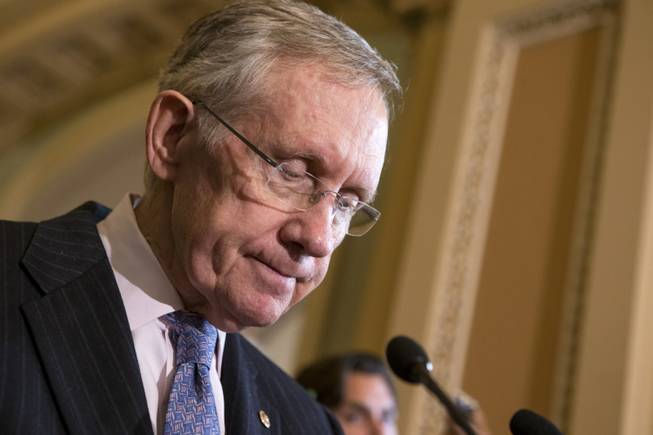
J. Scott Applewhite / AP
Senate Majority Leader Harry Reid of Nev. pauses while speaking with reporters about President Barack Obama’s meeting with Democrats on the situation in Syria, Tuesday, Sept. 10, 2013, on Capitol Hill in Washington.
Thursday, Feb. 6, 2014 | 3:10 p.m.
Senate Majority Leader Harry Reid has refrained from directly criticizing anyone on the subject of Iran, deftly ducking pressure from members of Congress to impose new sanctions, to give President Barack Obama time to see if a historic deal curbing Iran’s nuclear program can work.
But Thursday, Reid openly excoriated 42 Republicans – including Nevada Sen. Dean Heller – for sending a letter this week to Reid demanding he schedule a vote on new sanctions against Iran.
“This is not a partisan issue,” Reid said. “We’ve worked together, it’s a serious situation … we should not make this a partisan issue and that’s what 42 Republicans have done, and I think it’s wrong.”
Coincidentally, the Republicans penning the note Tuesday used the same language in expressing their frustrations to Reid.
“We should not allow the administration to turn one of the most bipartisan issues in America into a partisan one,” they wrote. “It’s time to vote.”
The group of Republicans asked Reid to bring the Nuclear Weapon Free Iran Act to the floor before the Presidents Day recess.
While only Republicans signed the letter, they aren’t alone in their support for a vote on the bill.
Democrats as close to Reid as Senate Foreign Relations Chairman Bob Menendez, D-N.J., and leadership team member Sen. Chuck Schumer, D-N.Y., have also co-sponsored the legislation and urged it be brought to a vote.
There are presently 59 senators openly supporting the bill, including author Menendez.
Reid did not answer a reporter’s followup question Thursday asking whether he planned to schedule a vote on the act anytime soon.
In November, Iran agreed to a temporary freeze of its nuclear program for six months in exchange for limited and gradual sanctions relief from the United States and five other world powers, including access to $4.2 billion from oil sales. Before the six-month period runs out, diplomats are working to negotiate a more sweeping agreement.
Obama maintains the provisions of the agreement – the first between Iran and the United States since the two countries cut off diplomatic ties during the Islamic Revolution in 1979 – “cut off Iran's most likely paths to a bomb.”

Join the Discussion:
Check this out for a full explanation of our conversion to the LiveFyre commenting system and instructions on how to sign up for an account.
Full comments policy